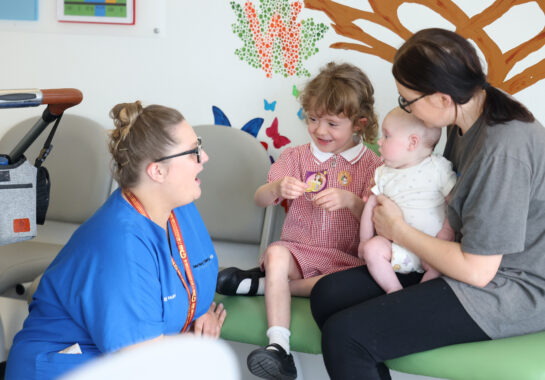The UK’s leading meningitis charity Meningitis Now is highlighting findings from a new national survey which found the disease that most concerns parents is meningitis.
The survey of parents commissioned by UKHSA found that overwhelmingly parents of babies and young children believe meningitis and septicemia pose the most serious risk to their children.
Parents of under-fives were asked about their views on childhood vaccines. Over 90% of parents said that they believe vaccines work and that they are safe.
Meningitis and septicaemia were considered very serious by 95% of the 1500 parents surveyed.
Some of the common signs and symptoms of meningitis include high temperature, cold hands and feet, pale mottled or blotchy skin, spots or rash and dislike of bright lights.
This survey shows what we all know as parents, that meningitis causes us to worry about our children. The disease doesn’t discriminate but under-fives are a high-risk group and its imperative we protect young children by getting them vaccinated on time.
“It’s encouraging to see that so many parents trust vaccinations and believe them to be safe, especially with so much misinformation and anti-vaccination sentiment circulating on social media and reported in the press in recent years.
“We have made great strides in our vision at Meningitis Now to make meningitis a thing of the past and that is largely down to vaccinations and awareness of the disease.”
Meningitis Now’s CEO Dr Tom Nutt
Meningitis Now has tirelessly campaigned in the fight against meningitis, advocating for the introduction of meningitis vaccines.
The survey is being highlighted as part of World Immunisation Week which runs from 24th April to 28th April 2023.
Dr Shamez Ladhani, Consultant Epidemiologist at UKHSA says,
“Meningococcal infections can be very serious, causing meningitis and septicaemia which can trigger sepsis. It can lead to severe brain damage, amputations and, sometimes, death. The meningococcal vaccines we offer to babies, toddlers and teenagers give them the best protection at the right time so we encourage parents to take up these vaccines when they are offered.
“If you’re not sure whether your child has received the vaccine, check their red book or speak to your GP practice.”
Following the recommendations of the JCVI (Joint Commission for Vaccines and Immunisations), vaccines which provide protection against the main causes of meningitis, have been introduced into the infant vaccine schedule.
These vaccines help protect against bacterial meningitis and septicaemia and have prevented thousands of cases of meningitis and saved many lives since their introduction.
Dr Alison Cave, Chief Safety Officer at the Medicines and Healthcare products Regulatory Agency says, “Meningitis can have a lifelong impact on families and tragically for 1 in 10 children can be fatal. Vaccines are the best way to protect children from infectious diseases like meningitis.
“All vaccines are only authorised by the MHRA for UK supply following a thorough review of safety, quality and efficacy information from clinical trials. Our experts test every batch of every vaccine before it can be used in the UK to ensure they meet our high standards, and we continuously monitor their safety through our Yellow Card scheme, where parents and carers can report any potential side effects they think might have occurred.
“We would encourage all parents to follow the advice of healthcare professionals and ensure that their children are fully vaccinated against potentially fatal diseases like meningitis.”
Parents who are unsure of the schedule for vaccinations, or if their child has missed any vaccines, should contact their GP surgery to arrange a catch up.
For further information about meningitis For further details on meningitis vaccinations Resources for school